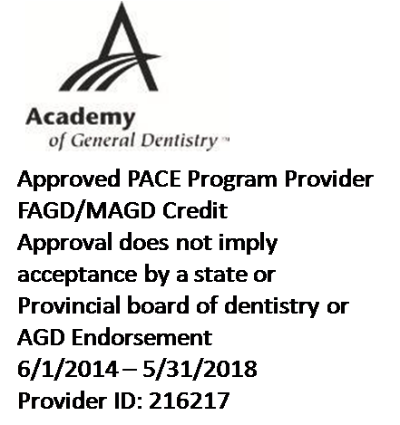AGD Endodontic Webinar Series
These webinars are designed to expand your knowledge of endodontics and provide you with new solutions for day-to-day challenges. Save money by registering for the entire three-part series.
Price for the series: Members $150 Non-members $250 Student Members $75
Registering for the series gives you access to all three webinars, which you can watch live or on-demand.
 |
Cracked Teeth: A Frustrating Phenomenon for Dentist and Patient Luis Camilo Yepes, DDS, MS Monday, Jan. 23, from 7 - 8:30 p.m. CST Credits: 1.5** Subject Code: 077 - Cracked Tooth & Restorations Price: Member $75 Non-member $125 Student Member $37.50 |
Description: The goal for this presentation is to review the diagnosis and treatment planning of longitudinal fractures, specifically cracked tooth and vertical fractures. Understand why this is a frustrating phenomenon for dentist and patients. The diagnosis of cracked teeth has historically been symptom based. The dental operating microscope can fundamentally change a clinician’s ability to diagnose this condition. A cracked tooth presents complex symptoms characterized by sensitivity to certain biting pressures and, often, cold stimuli. The diagnosis is extremely difficult, because the etiology is an incomplete, often minute fracture that is frequently hidden from view by a restoration or by the gingiva.
Learning Objectives:
- Describe the variables that lead the clinician to suspect a cracked tooth.
- Identify the steps for crack detection.
- Dental assistants will be able to describe the different crack types.
- Discuss the realities of the cracked tooth diagnosis and possible treatments.
 |
Endodontic Retreatment Indications: Getting to the Root of the Problem Maria Maranga, DDS, FACD, FICD Thursday, Feb. 16, from 7 - 8:30 p.m. CST Credits: 1.5** Subject code: 072 – Endodontic Infections Price: Members $75 Non-members $125 Student Members $37.50 |
Description: There are many reasons for initial RCT failure. Among these are insufficient debridement of canal spaces, missed canal anatomy, incomplete obturation, coronal leakage, latragenic causes, poor visibility or radiographs, and/or vertical root fracture. Participants will learn how to decide if retreatment is indicative in cases with post root canal treatment disease.
Learning objectives:
- Become familiar with identifying the reasons for root canal failure.
- Learn current and documented pharmacological uses of intra canal medicaments, antibiotics and pain medication.
- In the age of enhanced visualization and advanced radiography, the learner will assess his/her desire to tackle these retreatment cases, refer to a specialist or seek an alternate treatment plan.
 |
Management of Periapical Pathosis Chad P. Gehani, DDS, Associate Clinical Professor, New York University Thursday, March 2, from 7 - 8:30 p.m. CST Credits: 1.5** Subject code: 070 – Endodontics Price: Members $75 Non-members $125 Student Members $37.50 |
Description: The purpose of this presentation is to limit the scope of treatment of the endodontically involved pulp and extended periapical lesion with a non-surgical approach. More than 90 percent of all endodontic problems can be treated by this one therapy. For predictable and reproducible success in endodontic therapy, a careful and complete diagnosis must be made on each and every suspected tooth. Learn to avoid mistakes in pathological lesions that might be mistaken for an endodontic lesion: median maxillary cyst, globulomaxillary cyst, hemorrhagic traumatic bone cyst, lateral periodontal cyst, neoplasm or cementoma. Also learn to avoid mistakes between normal anatomic landmarks and endodontic lesions.
Learning objectives:
- Learn to avoid mistakes between endodontically involved teeth and other pathological lesions.
- Learn to treat endodontically involved teeth with a non-surgical method. No bacteria, no endodontic problems.
**Only registered attendees will receive CE credit.
Questions? Email courses@agd.org






